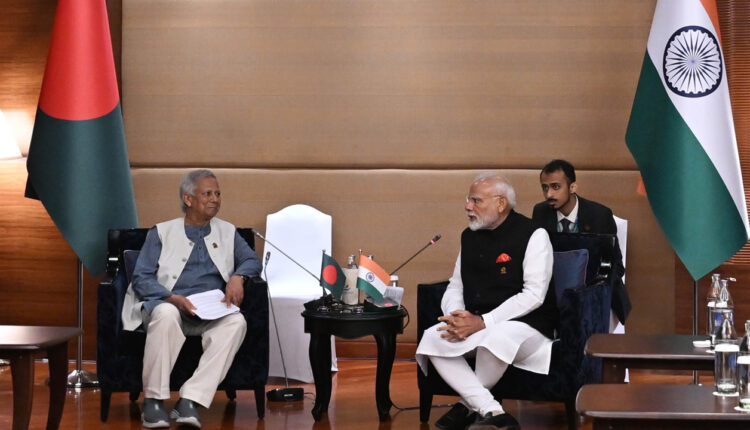Prime Minister Narendra Modi met Bangladesh’s interim chief advisor, Muhammad Yunus, on the sidelines of the BIMSTEC Summit in Bangkok today. The meeting, attended by External Affairs Minister S. Jaishankar and National Security Advisor Ajit Doval, covered key concerns, including the safety of minorities in Bangladesh and border security.
During the discussions, PM Modi reiterated India’s commitment to a democratic, peaceful, and inclusive Bangladesh. He underscored the importance of a people-centric approach in bilateral relations and emphasized the long-standing cooperation that has yielded benefits for both nations. However, he also cautioned against rhetoric that could strain ties between the two neighbors.
“The Prime Minister also urged that any rhetoric that vitiates the environment is best avoided. On the border, strict enforcement of the law and prevention of illegal crossings, especially at night, is necessary for maintaining border stability and security,” said Foreign Secretary Vikram Misri.
PM Modi expressed serious concerns about the safety and security of minorities in Bangladesh, including Hindus, and urged Dhaka to ensure their protection. He also called for thorough investigations into reported attacks on minority communities.
India-Dhaka Tensions Amid Bangladesh’s Growing China Ties
The meeting between the two leaders was particularly significant given the changing political landscape in Bangladesh. Following the ouster of Sheikh Hasina’s government in August last year, relations between India and Bangladesh have grown tense. The Awami League leader sought refuge in India after the interim government took over, and reports of attacks on minorities in Bangladesh have only deepened concerns in Delhi.
Adding to the strain, Muhammad Yunus’ recent remarks about India’s Northeastern region have sparked controversy. While speaking during a four-day visit to China, Yunus described the seven Northeastern states of India as landlocked and suggested that Bangladesh serves as their “guardian of the ocean,” hinting at potential economic ties with China.
This statement drew sharp reactions from Indian leaders, particularly Assam Chief Minister Himanta Biswa Sarma.
“The statement made by Md Yunus referring to the Northeastern states as landlocked and positioning Bangladesh as their guardian of ocean access is offensive and strongly condemnable,” Sarma said. He further emphasized the need for stronger road and rail infrastructure to reduce dependency on routes passing through Bangladesh and the Siliguri Corridor, also known as the Chicken’s Neck—a narrow land passage connecting the Northeast to the rest of India.
“Such provocative statements by Md Yunus must not be taken lightly, as they reflect deeper strategic considerations and longstanding agendas,” Sarma warned.
India Reaffirms Commitment to Bangladesh Ties
Despite recent tensions, PM Modi reaffirmed India’s commitment to strengthening bilateral relations. In a letter to Yunus on Bangladesh’s Independence Day (March 26), Modi highlighted the shared history of the Bangladesh Liberation War and stressed the importance of mutual sensitivity in fostering regional peace and stability.
“We remain committed to advancing this partnership, driven by our common aspirations for peace, stability, and prosperity, and based on mutual sensitivity to each other’s interests and concerns,” Modi wrote.
As geopolitical dynamics shift and Bangladesh deepens ties with Beijing, India is closely monitoring developments, balancing diplomacy with firm messaging on key security concerns.



Comments are closed.